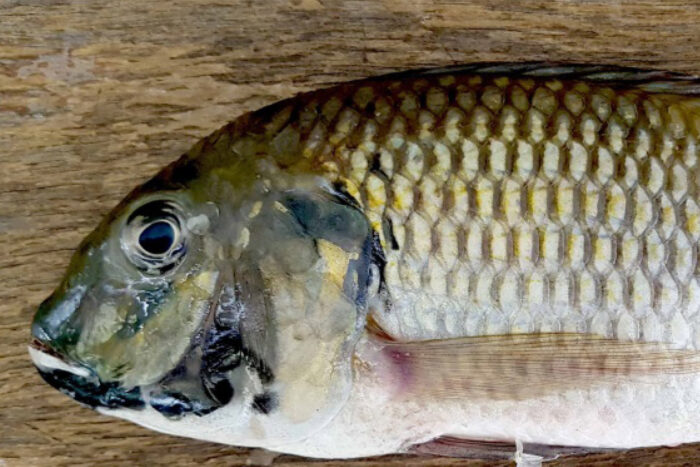
Thailand’s Department of Fisheries (DOF) has announced a major breakthrough in controlling the spread of the invasive Blackchin tilapia (Sarotherodon melanotheron). This species has rapidly proliferated, disrupting ecosystems. The solution was a specially engineered strain called Blackchin Tilapia 4n—a genetically modified variant designed to halt reproduction.
DOF has now begun testing the release of male Blackchin tilapia 4n in experimental sites to assess its effectiveness in reducing the population.
What is Blackchin tilapia 4n, and how does it help control the population?
Naturally, wild Blackchin tilapia have 2n chromosomes, allowing them to reproduce rapidly and spread uncontrollably. To counter this, DOF developed a 4n chromosome strain to break the reproductive cycle.
How it works:
• When a male Blackchin tilapia 4n mates with a wild female Blackchin tilapia 2n, their offspring will have 3n chromosomes, making them sterile (infertile).
• Over time, as more sterile offspring emerge, the overall population will naturally decline.
Unlike chemical-based methods or large-scale removal, this approach is safe, environmentally friendly, and non-invasive—minimizing harm to local ecosystems.
Field testing of Blackchin tilapia 4n
DOF has initiated live trials to monitor the effectiveness of this method. Key aspects under evaluation include:
✅ Mating competition – Can Blackchin tilapia 4n successfully compete with wild males for mates?
✅ Sterility confirmation – Are the resulting 3n offspring truly infertile as expected?
✅ Population reduction trends – Over time, does the Blackchin Tilapia population show signs of decline?
If successful, this method could become a sustainable, long-term solution for controlling invasive Blackchin tilapia populations without harsh interventions.
Using the barramundi as natural predators
Alongside the Blackchin tilapia 4n initiative, DOF is also deploying barramundi (Lates calcarifer), a natural predator of Blackchin tilapia, as an additional control measure.
Currently, the department is distributing barramundi fingerlings to farmers in Phetchaburi Province, encouraging them to release these fish into waters where Blackchin tilapia have become a problem. This method not only helps curb the invasive fish naturally but also provides farmers with an opportunity to raise barramundi for commercial purposes—creating a win-win solution for both the environment and the local economy.




